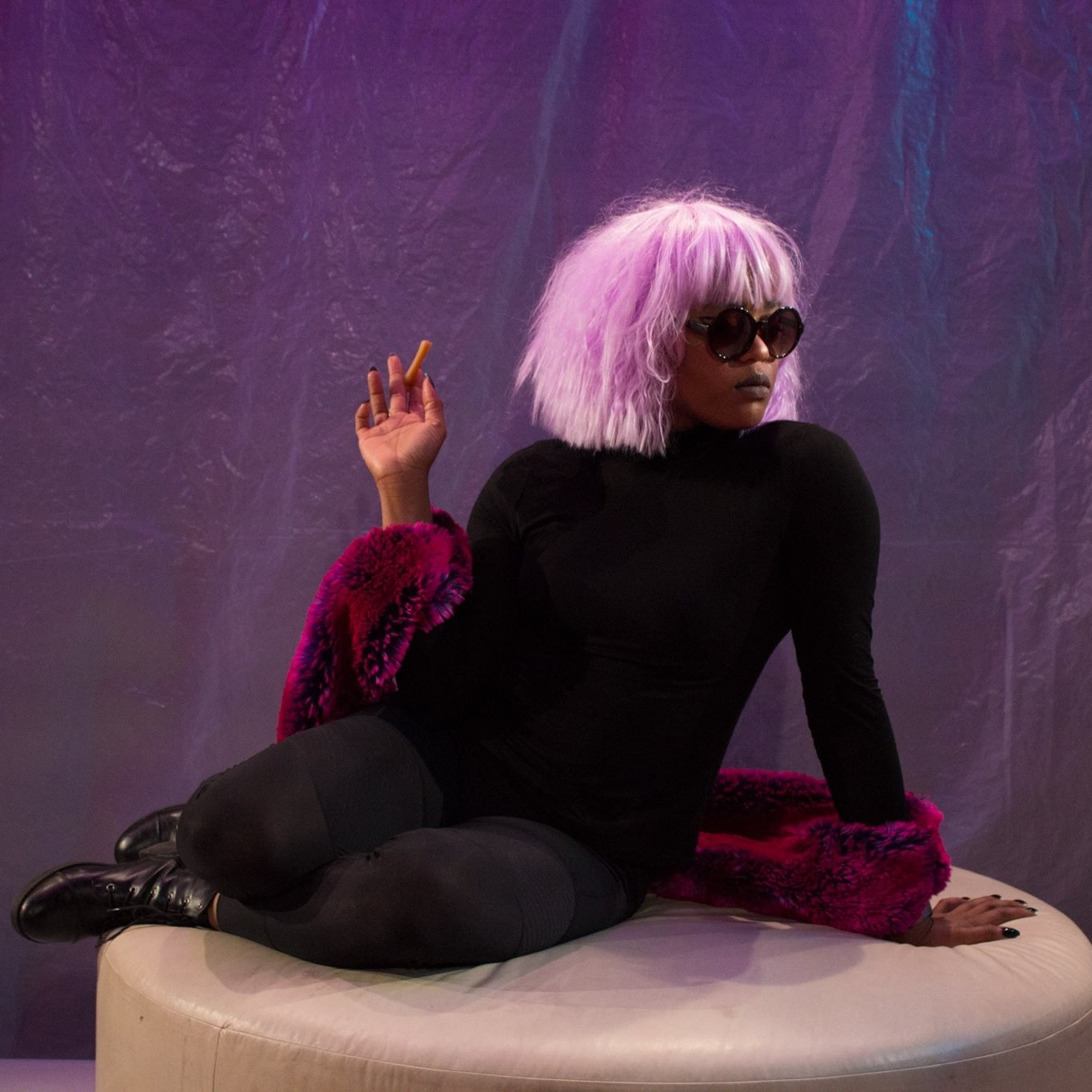Review of School Girls; Or the African Mean Girls Play, Yale Cabaret
Sure, we all know teens can be rather image-conscious—isn’t that when that tendency begins? No one—for the most part—quite likes the hair, skin, shape, features they inherit and have to “grow into.” In a girls’ boarding school in Ghana in 1986, the setting for Joceyln Bioh’s funny and thoughtful play School Girls, the growing pains are exacerbated by the pressure of a beauty pageant competition that will select a “Miss Ghana” from among the nation’s best schools to compete for the title of Miss Universe. The play dramatizes well the tension between community and competition—which is always part of schooling, often to debilitating effect. Someone gets to be “best student,” “most popular,” “most likely to succeed,” “best-looking.” Here, Paulina (Moses Ingram) wants to corral all those tags for herself, and woe to anyone who upsets this Queen Bee.
The play does a lot to tarnish Paulina. She’s an abusive bully toward hapless Nana (Malia West), a student who smuggles snacks between meals and gets called “a cow.” Paulina also undercuts her “best friend” Ama (Kineta Kinutu) at every opportunity (being “best friends” translates as “knowing all the dirt on each other”), and flaunts her popular-girl status for two underclassperson cousins, the hilarious Mercy (Vimbai Ushe) and Gifty (Gloria Majule). These two have mastered the art of public face—for Paulina, in line with her edicts—and private face—for each other, dispensing succinct shade. The early going of the play is refreshing in how it pokes fun at everyone, and at both the vanities of teens and the entire genre of teen comedy. As Headmistress Francis, Alexandra Maurice delivers the spot-on manner of the teacher—both steely and lovable—who cares deeply for her students.
Will Paulina get a comeuppance, and what form will it take? That’s the general question of this genre, but Bioh knows whereof she writes in choosing this particular school-girl population: the playwright’s mother went to the school depicted in the play, and Bioh knows the kinds of family situations these girls come from, not least Ericka (Adrienne Wells), a brand-new transplant from the U.S. (Ohio, specifically) who has come to finish her last year of schooling in Ghana where her dad is a big cocoa tycoon. She is lovely and seems thoroughly guileless and that may be the hardest combo for Paulina to best. And Ericka knows the difference between designer clothes and knock-offs and, contra Paulina, that “White Castle” is nothing like a castle. Worse, Ericka’s late mother was white, and that unleashes Paulina’s deepest insecurity.
All of Paulina’s efforts to be best can be fatally undercut by one fact: she’s darker than Ericka. As “Miss Ghana, 1966,” Eloise Amphonsha (Wilhemina Koomson), a former fellow-student at the school with Headmistress Francis, is a conceited recruiter for the pageant. Amphonsha wants Ericka because her fairer skin will make her competitive against all those very white countries that set the standards. She’s no doubt right about that, strategically, and she’s not really worried—though Headmistress is—about the message that sends. And there’s a further complication that makes choosing Ericka simply wrong. And yet.
As things get more intense, and less funny, Bioh is able to bring in the kinds of details that let us know why both Ericka and Paulina set such store by the façade each maintains. Both have suffered much, and getting to be “Miss Ghana” would be a way of overcoming at least some of it. The showdown is nicely matched by a showdown between Headmistress and Miss Ghana, 1966, and the elders’ reactions to how the girls behave is key to the drama here. Bioh knows that school both forms and deforms character and she lets all her characters have a chance at improving.
The cast, directed by first-year Yale School of Drama director Christopher D. Betts, works the material to rich effect. There’s a convincing command of how teens act, both among themselves and when adults are present, and when trying to be nice or just trying to play along. Ingram plays Paulina as “mean girl” as survival strategy, though we see her enjoy her manipulative side too much for us to be in her corner. As Ericka, Wells delivers a great coup de grâce at the end of her solo part in a choral rendition of Whitney Houston’s “The Greatest Love of All” that is both impressive and funny. Seeing Paulina crumple in response makes us feel sorry for her even as we can’t help laughing. The other girls butcher their solos with awful aplomb, all the while singing lyrics like “learning to love yourself is the greatest love of all” as if they know what that means.
The gaps between what we say and what we do, between what we try to teach and what kids learn are very real, and Bioh’s play makes the most of the irony of those situations while never losing sight of why we, collectively, have faith that effort for the sake of the young is never time wasted.
School Girls; Or, the African Mean Girls Play
By Jocelyn Bioh
Directed by Christopher D. Betts
Producers: Riw Rakkulchon & Lisa D. Richardson; Scenic Designer: Jessie Chen; Lighting Designer: Riva Fairhall; Sound Designer: Bailey Trierweiler; Costume Designer: Mika H. Eubanks; Technical Director: BenJones; Stage Manager: Edmond O’Neal
Cast: Moses Ingram, Wilhemina Koomson, Kineta Kunutu, Gloria Majule, Alexandra Maurice, Vimbai Ushe, Adrienne Wells, Malia West
Yale Cabaret
January 10-12, 2019
Up this week, January 17-19, is Charles Mee’s The Rules, adapted by Dakota Stipp, Zachry J. Bailey, Alex Vermilion, and Evan Hill. A wry and, one suspects, unsettling look at “the rules” we “civilized” try to live by.


